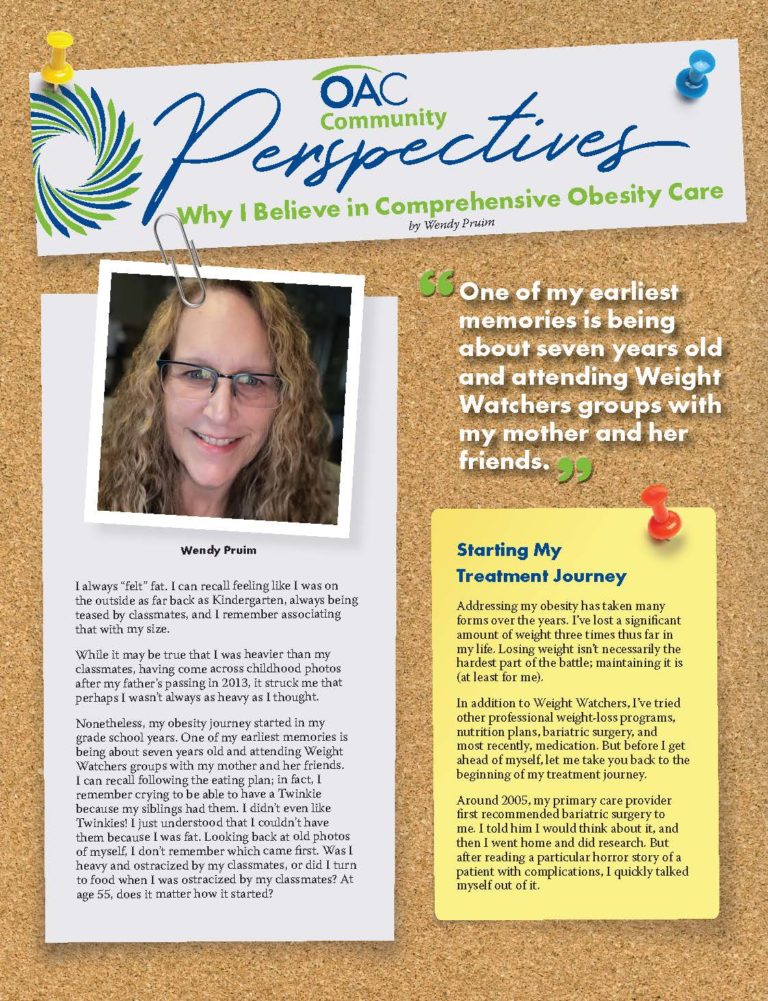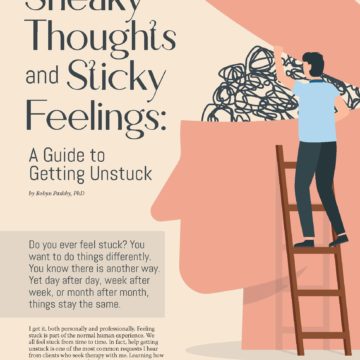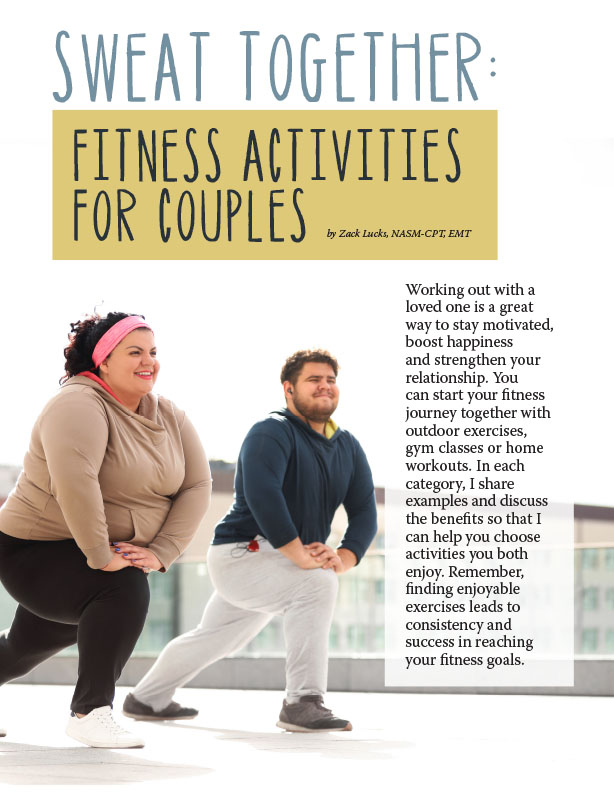OAC Community Perspectives: Why I Believe in Comprehensive Obesity Care


by Wendy Pruim
Winter 2023
I always “felt” fat. I can recall feeling like I was on the outside as far back as Kindergarten, always being teased by classmates, and I remember associating that with my size.
While it may be true that I was heavier than my classmates, having come across childhood photos after my father’s passing in 2013, it struck me that perhaps I wasn’t always as heavy as I thought.
Nonetheless, my obesity journey started in my grade school years. One of my earliest memories is being about seven years old and attending Weight Watchers groups with my mother and her friends. I can recall following the eating plan; in fact, I remember crying to be able to have a Twinkie because my siblings had them. I didn’t even like Twinkies! I just understood that I couldn’t have them because I was fat. Looking back at old photos of myself, I don’t remember which came first. Was I heavy and ostracized by my classmates, or did I turn to food when I was ostracized by my classmates? At age 55, does it matter how it started?
Starting My Treatment Journey
Addressing my obesity has taken many forms over the years. I’ve lost a significant amount of weight three times thus far in my life. Losing weight isn’t necessarily the hardest part of the battle; maintaining it is (at least for me).
In addition to Weight Watchers, I’ve tried other professional weight-loss programs, nutrition plans, bariatric surgery, and most recently, medication. But before I get ahead of myself, let me take you back to the beginning of my treatment journey.
Around 2005, my primary care provider first recommended bariatric surgery to me. I told him I would think about it, and then I went home and did research. But after reading a particular horror story of a patient with complications, I quickly talked myself out of it.
The next year, with all my personal attempts at weight-loss having failed, I started researching surgery again. I decided that I could do the Lap Band, so I checked my health insurance, found a local bariatric surgeon, and signed up for his informational meeting. I learned a lot about my options at that meeting and discovered that Roux-en-Y (RNY) Gastric Bypass was going to be my personal best option. From that point on, I was 100% dedicated to the surgery.
My Bariatric Surgery
While I jumped through a few hoops to get the surgery approved by my insurance, I’m fortunate that I didn’t have the obstacles with accessing care that many people did at the time. I didn’t even have to do any special pre-op diet. By early 2007, I was approved and scheduled my surgery for March 12th, 2007.
I immersed myself in researching the surgery — the pros, the cons, possible complications, etc. Then, at my final pre-op meeting with my surgeon, he asked me if I had any questions, and I said, “No!” I knew he couldn’t tell me what post-op life would look like for me, but I prepared myself by learning all I could about what to expect.
I also joined a gym and worked on my physical endurance. I was there at least five days a week, as the staff allowed my daughter to hang out in the café and lobby areas to do her homework while I worked out. I believe this went a long way in allowing me to bounce back fairly quickly after surgery.
The first two years or so after surgery were extremely successful. I went from my pre-op weight of roughly 360 lbs. down to 167 lbs., losing more weight than I eventually weighed. I never thought I would be that person.
Obstacles in My Path
In early 2009, I was feeling great — maintaining my weight in the 170s-180s and enjoying more confidence. But one evening, when I was putting my daughter to bed, I passed out. Over the following days, I had testing done and medical appointments to try to figure out what had happened. These tests eventually ended up taking several months of my life.
During this period of time, I stopped working out. I didn’t know what I should or shouldn’t be doing, so I did nothing. I was also laid off from my job. I felt like after finally getting my weight under control, my life blew up! I didn’t handle it well because I hadn’t learned to cope with stress any differently, so I ate my way through it. I regained over 100 lbs.
Learning the Importance of Mental Health
Fast forward to 2020 and the pandemic. While I had been able to lose a few lbs. here and there over the years, I was sitting at over 300 lbs. again and wasn’t feeling good about it. During an exam with a new primary care doctor, I told her I was finally open to trying a medication to assist me. She recommended Contrave, and I started a new treatment approach.
Almost from the first dose, it was like an answer to a prayer! The medicine helped me control my appetite so I could focus on other areas of my life. From May 2020 to November 2022, I lost over 111 lbs.
My weight-loss journey has taught me a lot. Every time I lost weight before, I regained it, plus more over a short period of time. Why? Because I never dealt with the mental aspects of my weight. While many people have physical and/or metabolic issues that underlie their obesity, my issue was — and still is — my mental health.
When I had surgery, all I had to do to get approved was attend one appointment with a mental health professional. It was essentially a rubber stamp on the pre-surgery checklist. The majority of the appointment was spent in the waiting room completing a standardized personality questionnaire. Afterward, I had a brief conversation with the mental health professional where they asked me why I wanted the surgery and what I expected from it. That’s about it.
I was more comfortable at 360 lbs. than I was at 167. I didn’t know how to be that smaller person! At 360 lbs., I felt invisible. At 167, there were times I was afraid to walk through a parking garage by myself. That was never something I had dealt with before.
I believe mental health care should be integral to any weight-loss approach. It angers me that mental health isn’t treated the same as physical health. Yes, many health insurance policies have some allowance for mental health visits, but they historically have also limited them to a dozen or fewer per calendar year. That is not sufficient for someone to adequately deal with underlying issues that may be driving their obesity.
What I’ve Learned About Living with Obesity
I like to think that I’m a realist. I know that I can never adequately explain to someone who hasn’t personally dealt with obesity what it is like to live a life with it.
Yes, I can explain why those exceedingly popular resin chairs always strike fear in my gut. But do you really understand the level of humiliation that I experienced when I broke not one, but two of them when trying them out in one of the big box stores? Outsiders are more apt to find it a funny story and not understand how soul crushing it can be.
The best I can do is to try to explain how almost every single daily activity is touched by obesity. From wondering if you will fit in the restaurant chair or booth to navigating your way through a crowded venue, you spend your time anticipating the best way to move through a space without infringing on everyone else. It’s chronic. It’s exhausting. And it can be depressing when you don’t see a way out of it.
That’s why I believe in comprehensive obesity care — and why mental health should never be overlooked in the process. I still don’t have a better handle on my mental health than I had in the past, but I am working on it. I still find it hard and cost-prohibitive to get the care that I need.
Thankfully, my personal journey since discovering the Obesity Action Coalition (OAC) has brought me out of myself and helped me see the bigger picture with obesity. I’ve learned the impact my personal story can have on others like me and people who are in a position to help drive change by expanding access to obesity care and standing against weight bias. Your story may not change legislation (it could, though!), but it may be just what someone else needs to read/hear to take a step in the right direction and advocate for themselves.
Do You Want to Share Your Story?
Whether you have a story about navigating obesity, facing weight stigma, or inspiring others, your voice is important. Visit the OAC’s story project at WeightoftheWorld.com to share yours today. Not sure what to say? Consider one of our question prompts to guide you.
If you would like your story to be featured in a future issue of Weight Matters Magazine, please email membership@obesityaction.org.
by Yelena Kibasova Spring 2024 The fitness world is evolving, with new trends and innovations that promise…
Read Articleby Robyn Pashby, PhD Winter 2024 “No one is ever going to date you if you don’t…
Read Articleby Zack Lucks, NASM-CPT, EMT Winter 2024 Working out with a loved one is a great way…
Read Article








